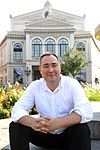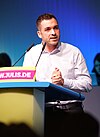Young liberals
| Young liberals | |
|---|---|
| Chairperson | logo |
 Ria Schröder |

|
| Basic data | |
| Art | Youth organization |
| Alignment | liberalism |
| Establishment date | November 1, 1980 |
| Place of foundation | Bonn-Bad Godesberg |
| Chairperson | Ria Schröder |
| Deputy |
|
| Treasurer | Mareike Röckendorf |
| Addresses | |
| address | Reinhardtstrasse 14, 10117 Berlin |
| Website | www.julis.de |
| structure | |
| Members | 10,000 (as of August 2017) |
| Memberships | IFLRY , LYMEC and LYBS |
The Junge Liberalen (short name: JuLis ) are a liberal youth association in Germany that is officially recognized by the FDP as an organizationally and financially independent apron organization .
Content profile
The first basic program of the all-German Young Liberals was decided under the heading "Humanistic Liberalism" after many years of discussion at the 8th Federal Congress on March 6, 1994 in Hanover. At the 37th Federal Congress on October 26, 2008 in Pforzheim , a revision of the basic program of 1994 under the title "Humanistic Liberalism - Thought for the Future" was decided by the delegates after a long discussion, including in nationwide regional conferences. It mainly focuses on holistic liberalism, civil rights and the social market economy.
As a rule, the positions of the Young Liberals do not differ in their basic liberal tendencies, but clearly differ in individual issues from those of their parent party. Above all, the Young Liberals focus on civil rights , socio-political and ecological issues much more than the FDP. Here, after 2002, the Young Liberals were able to bring them back into the focus of the mother party. The question of environmental protection was taken up by the federal party congress in Rostock in 2006 and a program based on these principles was adopted.
Most of the time, the Young Liberals formulate their views much more decisively than their parent party. This also applies to economic policy. Even more than the FDP, the Young Liberals see themselves as guardians of the market economy doctrine - regardless of lobbyists , associations and chambers, for example in their positioning to abolish compulsory IHK membership, and emphasize the liberal basis of a functioning social market economy .
The Young Liberals like to see themselves as the engine of the FDP. In the past , the youth organization was able to help shape the FDP program on a number of issues. The FDP's commitment to the ecological market economy, to citizens' money , to the controlled distribution of hard drugs (Münster 1993) and to the abolition of compulsory military service (Berlin 2001) often arises from motions adopted by their youth organization at FDP federal party conferences with only a narrow majority. The Young Liberals were able to decisively influence the Wiesbaden principles of the FDP through their then federal chairman Michael Kauch . In addition, at the request of the Young Liberals, the FDP changed the preamble of its basic program: Since then, the FDP has viewed "courtesy policy" not only as a problem in economic policy, but also in domestic and legal policy (Wiesbaden Party Congress, 1997). Another success of the JuLis was the decision of the FDP to separate from the Freedom Party of Austria in 1993 under the then federal chairman Ralph Lange . At the 56th federal party conference of the FDP in May 2005, the Young Liberals, led by federal chairman Johannes Vogel, pushed through a resolution to abolish the " Great bugging attack ". At the 59th party congress, three years later in Munich, the Young Liberals called for a new basic program of the FDP. At the 66th Federal Party Congress in 2015, the Young Liberals successfully introduced a motion to demand the legalization of hemp as an intoxicant .
structure
organization
The Young Liberals are organized nationwide and have around 10,000 members. The lowest structure is the local association, followed by the district association, then, apart from a few regional associations, the district association and the regional association. In independent cities, the local association is sometimes called the city association and replaces the district association. The superordinate is the federal association, whereby the federal association is a registered association , as well as some state associations. The areas of the 16 regional associations are identical to the borders of the federal states. The same applies mostly to the district and district associations, which are usually based on the boundaries of administrative districts or districts. Local / district / district member assemblies as well as district and state congresses as well as federal congresses usually re-elect the executive boards of the respective structure annually and are the highest bodies at the respective association level. The state congresses also elect the delegates from the state associations to the federal congress every year, and in some state associations, delegates are also elected to the state congresses at district congresses. The state and federal level congresses elect a state or federal arbitration tribunal every two years.
The chairmen of the respective JuLi branches (or representatives specially elected by the JuLis) are generally co-opted into the board of the corresponding FDP association, i.e. they are allowed to participate in the meetings of the respective FDP board - usually without voting rights . The Young Liberals are members of the international umbrella organizations IFLRY ( International Federation of Liberal Youth ), LYMEC ( European Liberal Youth ) and LYBS ( Liberal Youth of the Baltic Sea ).
membership
Anyone between the ages of 14 and 35 can become a member. Membership ends automatically at the age of 35; for officials of this age, when their function expires. Depending on the financial or employment situation, a membership fee must be paid, which is determined and collected by the district associations.
The originally compulsory membership in the FDP was abolished after fierce internal discussions at the unification congress with the Young Liberal Action of the GDR in 1990. For the federal executive board and partly also for the state and district executive boards, however, there is still an obligation to simultaneously be a member of the FDP. The member magazine jung + liberal of the Federal Association of Young Liberals appears four times a year.
Regional associations
The Young Liberals have associations in all federal states .
| country | Chairman |
|---|---|
| Baden-Württemberg | Valentin Christian Abel |
| Bavaria | Maximilian Funke-Kaiser |
| Berlin | David Jahn |
| Brandenburg | Matti Karstedt |
| Bremen | Johannes Wicht |
| Hamburg | Carl Cevin-Key Coste |
| Hesse | Niklas Hannott |
| Mecklenburg-Western Pomerania | Brian Kipke |
| Lower Saxony | Lars Alt |
| North Rhine-Westphalia | Alexander Steffen |
| Rhineland-Palatinate | Luca Lichtenthäler |
| Saarland | Julien François Simons |
| Saxony ( JuliA ) | Johannes Zeller |
| Saxony-Anhalt | Kai Krause |
| Schleswig-Holstein | Maximilian Mordhorst |
| Thuringia | Philip Riegel |
history


Since the beginning of the 1970s there were young FDP members who did not agree with the policy of the then FDP youth organization Young Democrats . While the young democrats viewed themselves as part of the extra-parliamentary opposition , which was on the march through the institutions ( "The FDP is the agency of the forces we are actually fighting" ) and supported the left-wing liberal wing within the FDP, the founders of the JuLis tended to more about the right wing at the time, which leaned towards classical liberalism . They wanted to form a youth organization of the FDP. The first regional liberal youth organizations to break away from the young democrats emerged in Edingen-Neckarhausen (1974), Bonn (1975), Starnberg (1975) and Berlin (1978).
On January 21, 1979, the Julis was founded under the name Arbeitsgemeinschaft Junge Liberaler in the FDP in Bonn-Kessenich . They elected a coordinating committee to summarize the activities of the various groups and passed a founding call . Regional discussion groups for young liberals were founded. The first regional associations followed in June 1980 in Saarland , North Rhine-Westphalia , Lower Saxony and Hamburg .
The first Federal Congress of Young Liberals took place on November 1st and 2nd, 1980 in Bonn-Bad Godesberg . Hans-Joachim Otto from Frankfurt am Main was elected as the first federal chairman .
In 1982 the FDP and Young Democrats increasingly distanced themselves from one another. After the reunification in Bonn, the young democrats finally separated from the FDP. The FDP then declared the Young Liberals to be their new youth organization . In 1983, Guido Westerwelle was elected federal chairman of the JuLis . He held the office until 1988 and later became federal chairman of the FDP.
On November 17, 1989, the Young Liberal Action was founded in the GDR , an independent youth association closely related to the LDPD . It reflects joined Liberal Democratic Youth ( Dresden ), the Young Liberals ( Jena ), LILA - democratic youth ( Berlin ) and the Liberal Youth ( Potsdam ) together. Its founding congress took place in Weimar on February 24 and 25, 1990 . The first chairman was Olaf Oßmann, Ivo Klatte and Bärbel Böttcher were elected as deputies. The first treasurer was Mario März, the first managing director Andreas Pautzke. The JuliA and the Young Liberals decided at their unification congress on September 8th and 9th, 1990 in the Berlin Reichstag building to merge into an all-German, liberal youth association.
In the 2004 European elections, Alexander Alvaro, the JuLi top candidate, entered the European Parliament . In the 2009 European elections, Alexander Alvaro also moved in as the top candidate for JuLi, and Nadja Hirsch (Munich) had been a member of the Young Liberals in the European Parliament since 2009 . In the 2005 Bundestag election , a total of eight young liberals came to the Bundestag as FDP MPs , including the youngest FDP MP Florian Toncar . In the 2009 Bundestag elections , the Young Liberals were represented in the Bundestag with 17 representatives, including the youngest MP Florian Bernschneider . With 17 of 93 FDP MPs, the Young Liberals were the most influential youth organization of the parties in the 17th German Bundestag .
A total of 12 young liberal MPs are represented in the 19th German Bundestag .
On April 27, 2018, Ria Schröder was elected as the new chairman and thus Konstantin Kuhle's successor with 115 to 75 votes after a fight candidacy against Phil Hackemann . At the 2019 federal congress, Ria Schröder was confirmed in office with 57%.
Young Liberals' records are kept in the Liberalism Archive of the Friedrich Naumann Foundation for Freedom in Gummersbach (North Rhine-Westphalia).
Chairperson
| Surname | Term of office | important political offices and mandates | |
|---|---|---|---|

|
Hans-Joachim Otto | 1980-1983 | Parliamentary State Secretary to the Federal Minister of Economics and Technology (2009–2013), Member of the Hessian State Parliament (1983–1987), Member of the German Bundestag (1990–1994 and 1998–2013) |

|
Guido Westerwelle | 1983-1988 | Secretary General (1994–2001) and Federal Chairman (2001–2011) of the FDP, Member of the German Bundestag (1996–2013, Group Chairman 2006–2009), Federal Minister for Foreign Affairs (2009–2013, including Vice Chancellor until May 2011 ) |

|
Georg Neubauer | 1988-1989 | |

|
Hermann Brem | 1989 | Change to Alliance 90 / The Greens |

|
Birgit Homburger | 1990-1993 | State chairwoman of the FDP Baden-Württemberg (2004–2014), member of the German Bundestag (1990–2013, parliamentary group leader 2009–2011) |

|
Ralph Lange | 1993-1995 | |

|
Michael Kauch | 1995-1999 | Member of the federal executive committee of the FDP (1995–2001, 2011–2013 and since 2017 as a permanent guest), member of the Bundestag (2003–2013) |

|
Daniel Bahr | 1999-2004 | Member of the German Bundestag (2002–2013), Parliamentary State Secretary (2009–2011) and Federal Minister of Health (2011–2013) |

|
Jan Dittrich | 2004-2005 | |

|
Johannes Vogel | 2005-2010 | General Secretary of the FDP North Rhine-Westphalia (since 2014), member of the German Bundestag (2009-2013 and since 2017) |

|
Let Becker | 2011-2013 | Deputy regional chairman of the FDP Hessen (2014-2017) |

|
Alexander Hahn | 2013-2014 | Member of the federal executive committee of the FDP (2012-2019) |

|
Konstantin Kuhle | 2014-2018 | Member of the German Bundestag (since 2017), General Secretary of the FDP Lower Saxony (since 2018) |

|
Ria Schröder | since 2018 | Member of the federal board of the FDP (since 2019) |
See also
- List of youth organizations in Germany
- Overview of the members of the Young Liberals recorded in Wikipedia
Web links
literature
- Detmar Doering , Lieselotte Stockhausen-Doering: Forces of Change? Liberal youth organizations from the social liberal coalition to the present day. COMDOK, Sankt Augustin 1990, ISBN 3-89351-053-2 .
- Joachim Stamp : History and self-image of the Young Liberals from 1989 to 2005 with special consideration of the establishment of the Young Liberal Action in the GDR and the unification process 1989/1990. Diss. Rer. pole. Potsdam 2010 (Ms.), DNB 1014010152 .
Individual evidence
- ↑ julis.de
- ^ FDP: subdivisions & apron. Retrieved October 7, 2019 .
- ^ Full Member Organizations , accessed December 9, 2015
- ^ Articles of Association , accessed on July 14, 2017
- ↑ jung + liberal , accessed on July 14, 2017
- ^ Association structure , accessed on October 25, 2018
- ↑ Valentin Abel becomes the new JuLi country manager. In: julis-bw.de. March 4, 2017. Retrieved October 25, 2018 .
- ↑ With a new state board for the European elections. In: julis-bayern.de. November 11, 2018, accessed May 4, 2019 .
- ↑ State congress elects David Jahn as the new state chairman! In: julis-berlin.de. February 17, 2018, accessed October 25, 2018 .
- ↑ New state executive elected. In: julis-brandenburg.de. March 14, 2016, accessed October 25, 2018 .
- ↑ Our state board - Young Liberals Bremen. In: julis-bremen.de. Retrieved March 10, 2020 .
- ↑ Young Liberals re-elect the state executive. In: julis-hh.de. February 22, 2016. Retrieved October 25, 2018 .
- ^ Young liberals elect a new state board and chairman. In: julis-hessen.de. November 18, 2019, accessed March 10, 2020 .
- ↑ New state executive elected. In: julis-mv.de. November 2, 2019, accessed March 10, 2020 .
- ^ Lars Alt remains state chairman of the Young Liberals of Lower Saxony. In: julis-nds.de. March 9, 2019, accessed April 28, 2019 .
- ↑ Ratinger Alexander Steffen leads the Young Liberals NRW. In: julis-nrw.de. August 25, 2020, accessed August 25, 2020 .
- ↑ Habemus state chairman! In: julisrlp.de. September 11, 2018, accessed October 25, 2018 .
- ↑ Young Liberals Saar elect new state chairman. In: julis-saar.de. August 27, 2017. Retrieved October 25, 2018 .
- ↑ Young Saxon liberals elect a new chairman. In: julia-sachsen.de. March 10, 2020, accessed March 14, 2020 .
- ↑ State Executive Board - Young Liberals Saxony-Anhalt. In: julis-sachsenanhalt.de. Retrieved March 10, 2020 .
- ↑ Max Mordhorst is the new state chairman. In: julis-sh.de. March 10, 2019, accessed April 15, 2019 .
- ↑ The State Board - Young Liberals Thuringia. In: julis-thueringen.de. Retrieved March 10, 2020 .
- ^ History of the Young Liberal Action , accessed on May 7, 2011
- ↑ n-tv news: Young liberals confirm Ria Schröder as chairwoman. Retrieved April 28, 2019 .
- ↑ Inventory query , accessed on December 9, 2015